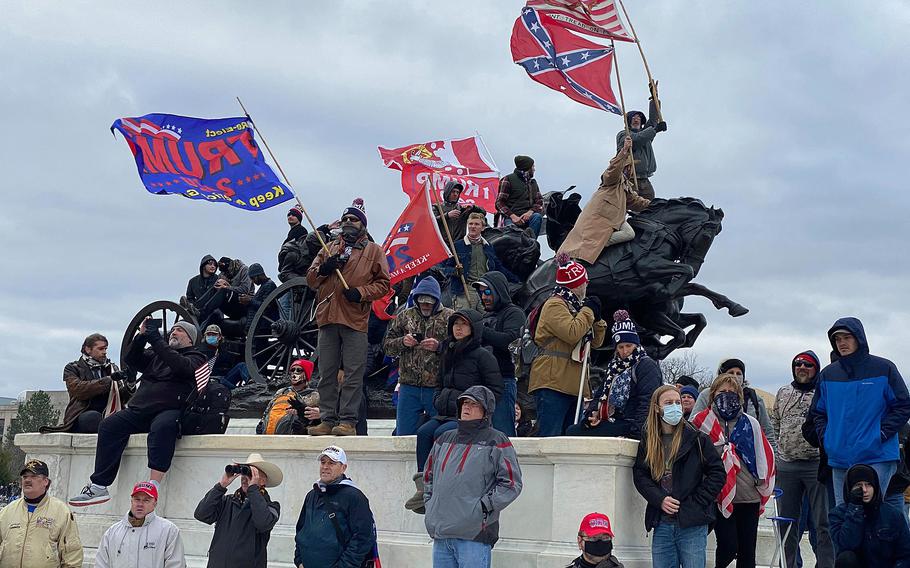
Rioters storm the Capitol in Washington, D.C., on Jan. 6, 2021. New Army rules issued Wednesday, June 26, 2024, clarify soldiers cannot knowingly participate in or support any extremist activity in or out of uniform. (Robert H. Reid/Stars and Stripes)
Soldiers cannot post, like or share any extremist or gang-affiliated content on social media or participate in other extremist activity even when they are off duty, according to new Army rules unveiled Wednesday.
The new rules clarify soldiers — on active duty or in the Reserve or National Guard — cannot knowingly participate in or support any extremist activity in or out of uniform, according to two new memorandums that Army Secretary Christine Wormuth sent to the force Wednesday. Those caught supporting extremist or gang activity — including wearing clothing, flying flags or sporting bumper stickers on their vehicles in support of extremist views — must be reported to their commanders, who are now required to report all such allegations to the Defense Department inspector general and the Army’s Criminal Investigation Division, according to the memos.
“Active participation in extremist activities can be prohibited even in some circumstances in which such activities would be constitutionally protected in a civilian setting,” Wormuth wrote in one memo. “Enforcement of this policy is a responsibility of every command, is vitally important to unit cohesion and morale and is essential to the Army’s ability to accomplish its mission.”
The new rules come some two years after the Defense Department issued guidance to the force about extremist activities in response primarily to the Jan. 6, 2021, attack on the U.S. Capitol by supporters of former President Donald Trump. More than 200 military-affiliated individuals have been charged or convicted for participating in the attack, including about 24 people who were serving in the military at the time, according to data released last month by the National Consortium for the Study of Terrorism and Responses to Terrorism. About 16% of those charged in the siege to date were veterans or service members, according to the data.
The new rules released Wednesday bring the Army into compliance with a 2021 congressional mandate requiring the Defense Department and its services to standardize reporting processes to the inspector general so the watchdog could better gauge the military’s response to extremism within its ranks, said Bryce Dubee, an Army spokesman.
In the inspector general’s 2022 report on extremist activity within the military’s ranks, the office reported 146 accusations of extremist activity among service members in 2021. Last year, the IG reported 183 allegations of extremist activity among U.S. troops in 2022.
The new guidance also provides “leaders more precise guidance on effectively addressing these activities,” Dubee said.
The memos direct more training for soldiers on extremism. U.S. Army Training and Doctrine Command, which oversees initial entrance training and other service schoolhouses, will implement training in its courses to “ensure that the policy and procedures on prohibited [extremist] activity” are understood by soldiers in its programs.
The memos also instruct Army commanders to advise their soldiers periodically “that extremist activities are inconsistent with the Army goals, beliefs and values, as well as the oaths of office and enlistment” and prescribe standardized extremism training to be conducted by trained professionals.
Wormuth’s memos also more clearly define prohibited extremist activities. Wormuth offered a 14-part definition of banned activity that includes “advocating, engaging in, or supporting the overthrow of the” government, advocating for discrimination “based on race, color, national origin, religion, sex, gender identity or sexual orientation” and “knowingly displaying paraphernalia, words, or symbols” that support extremist ideals or groups.
The extremist activity definitions also bar soldiers from providing monetary contributions to extremist groups, attending their meetings or engaging with them online, “including posting, liking, sharing, re-tweeting, or otherwise distributing content” supporting extremism.
Soldiers found to have engaged in such activity face administrative or criminal punishment, and they could be booted from the Army or lose their security clearance, Wormuth wrote.
She encouraged commanders to intervene early when they suspect soldiers could become involved in extremist activity, “primarily through counseling.”
The Army secretary vowed to continue working on the issue, writing it was imperative the service stamp out any extremist activity among its troops.
“Active participation in extremist and criminal gang activities is inconsistent with the responsibilities and obligations of military service, including the U.S. Army oaths of office and enlistment,” Wormuth wrote. “Such prohibited activities damage the nation’s trust and confidence in the Army as an institution and as a professional fighting force. They undermine morale and reduce combat readiness. Extremism calls into question a soldier’s ability to follow orders from, or effectively lead and serve with, persons of diverse backgrounds.”